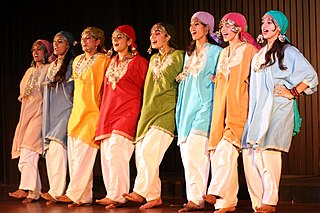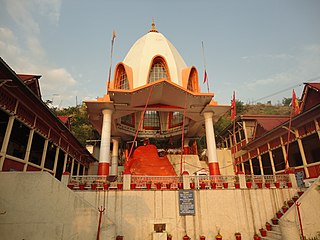Related Research Articles

The Kashmiri Pandits are a group of Kashmiri Hindus and a part of the larger Saraswat Brahmin community of India. They belong to the Pancha Gauda Brahmin group from the Kashmir Valley, located within the Indian union territory of Jammu and Kashmir. Kashmiri Pandits are Hindu Kashmiris native to the Kashmir Valley, and the only remaining Hindu Kashmiris after the large-scale of conversion of the Valley's population to Islam during the medieval times. Prompted by the growth of Islamic militancy in the valley, large numbers left in the exodus of the 1990s. Even so, small numbers remain.
Bhat is a surname in the Indian subcontinent. Bhat and Bhatt are shortened renditions of Brahmabhatta or Bhatta.

Munshi is a Persian word, originally used for a contractor, writer, or secretary, and later used in Mughal India for native language teachers, teachers of various subjects, especially administrative principles, religious texts, science, and philosophy and were also secretaries and translators employed by Europeans.

Kashmiris are an Indo-Aryan ethnolinguistic group speaking the Kashmiri language and originating from the Kashmir Valley, which is today located in Indian-administered Jammu and Kashmir.
Dhar is a surname commonly found among the Hindu Bengali Kayastha community in West Bengal, India. Dhar or Dar is also used by some Kashmiri clans and communities native to the Kashmir Valley in Jammu and Kashmir, India, and common today among Kashmiri Hindus and Kashmiri Muslims.
Sapru, also spelled as Sipru or Saproo is a Kashmiri Pandit clan and surname native to the Kashmir Valley of Jammu and Kashmir, India.
Haksar is a Kashmiri Pandit surname and clan. They are native to the Kashmir Valley within the Indian state of Jammu and Kashmir and they have a long tradition of Indian administrative service based on fluency in a link language - Persian under the Mughals and English under the British. In light of this fact, the Haksar family historically became a prominent administrative family in other parts of India, namely in Indore and Gwalior.
Jalali is a Kashmiri surname. Notable people with the surname include:

Kashmiri Hindus are ethnic Kashmiris who practice Hinduism and are native to the Kashmir Valley of India. With respect to their contributions to Indian philosophy, Kashmiri Hindus developed the tradition of Kashmiri Shaivism. After their exodus from the Kashmir Valley in the wake of the Kashmir insurgency in the 1990s, most Kashmiri Hindus are now settled in the Jammu division of Jammu and Kashmir and other parts of the country. The largest group of Kashmiri Hindus are the Kashmiri Pandits.
Zutshi is a Kashmiri Pandit clan and surname, originating from the Kashmir Valley of Jammu and Kashmir, India.
Bhan is a Kashmiri Pandit clan and surname native to the Kashmir Valley of Jammu and Kashmir, India. The Bhan Brahmin dynasty founded an erstwhile tribal hill state of Kashmir in the 10th century AD. It was ruled by the Bhan dynasty for two hundred years. Currently, all the territory of this state of Bhan is found in the Sidhnuti district of Pakistan Occupied Kashmir. Bhan, as a surname, is also used by Punjabi Saraswat Brahmins.
Qazi Nisar was the Mirwaiz of South Kashmir. He was a founding member of the Muslim United Front (MUF) that contested the rigged 1987 Legislative Assembly elections in Jammu and Kashmir, and Ummat e Islami. He was a vocal advocate of freedom for Kashmiris.
Razdan is a Kashmiri Pandit surname and clan that refers to the royal or aristocratic bloodline of old Kashmir, mostly attributed to the warriors of the Kashmir Valley of Jammu and Kashmir, India. They are Saraswat Brahmins from the Kashmir Valley, belonging to the larger community of Pancha-Gauda Brahmins, and are widely known for their allegiance to Lord Shiva.
Pandit, also spelled as Pandita or Pandith is a Kashmiri Pandit clan or surname, native to the Kashmir Valley in Jammu and Kashmir, India. Pandit as a last name depicts a Brahmin lineage and is used by both Hindus and Muslims in Kashmir.
Bazaz is a Kashmiri Pandit clan and surname native to the Kashmir Valley of the Indian union territory of Jammu and Kashmir.
Thussu, also spelt as Thusu, Thusoo or Thussoo is a Kashmiri Pandit clan and surname native to the Kashmir Valley of the Indian union territory of Jammu and Kashmir. Thussu as a last-name is used by both Kashmiri Hindus and Kashmiri Muslims of Hindu lineage.
Raina is a Kashmiri Pandit clan and surname, native to the Kashmir Valley of Jammu and Kashmir, India. Raina as a last-name depicts a Brahmin-lineage and is today found amongst both Kashmiri Hindus and Kashmiri Muslims.
Ganjoo, also spelt as Ganju is a Kashmiri Pandit clan or surname, native to the Kashmir Valley in Jammu and Kashmir, India.
References
- ↑ Pandit, Bansi (March 22, 2008). Explore Kashmiri Pandits. Dharma Publications. p. 101. ISBN 9780963479860 . Retrieved June 5, 2024.
- 1 2 3 4 5 6 Wani, Muhammad Ashraf; Wani, Aman Ashraf (2023). The Making of Early Kashmir- Intercultural Networks and Identity Formation. Taylor & Francis. p. 72. ISBN 9781000836554 . Retrieved June 5, 2024.
The ethnicity was also constructed on the basis of tribal background, occupations or some contingencies. For instance, the brahamanas were divided into 103 gotras (tribal divisions), and each gotra was divided into distinctive families famous after family appellation called kram. Kram is often the relic of a nickname applied to the ancestor of the subdivision. And when during the rule of Muslims, some of them held different positions in the state apparatus. They came to be called after those offices such as Razdan, Fotadar, Ambardar, Ganju, Karawani, Diwani, Qazi, Muhatasib, Naqib, Amin and Waguzari, which became their permanent surnames.
- ↑ South Asian Language Review - Volumes 3-4. Creative Book Publishers International. 1993. p. 62. Retrieved June 5, 2024.
Qazi - one who decides cases, a judge